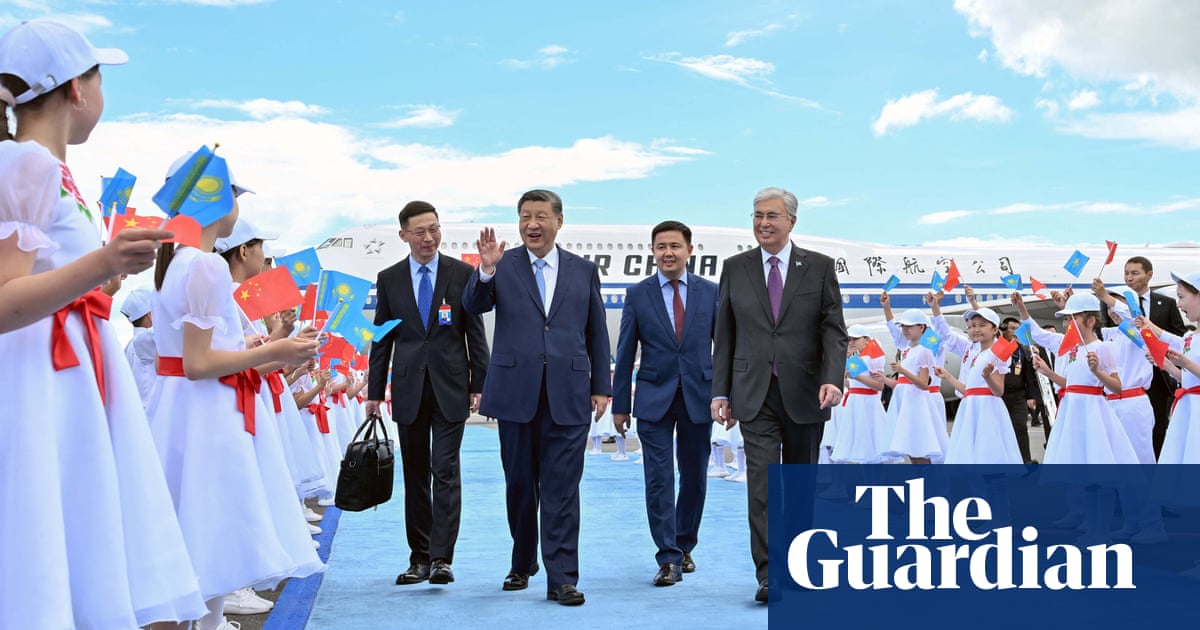Leaders from China, Russia and countries in the global south are gathering in Kazakhstan for the annual meeting of the Shanghai Cooperation Organisation (SCO), a group that has been described as the “anti-Nato”.
The summit is part of China’s efforts to establish what it calls a “multilateral” world order that is not dominated by the US. But it is also a forum in which China and Russia’s “strategic partnership” will be tested by their competing desires to wield influence in central Asia.
Xi Jinping, China’s president, arrived in Astana on Tuesday for a five-day trip that will include state visits to Kazakhstan and Tajikistan. More than a decade ago, Xi used an official visit to Kazakhstan to launch the belt and road initiative, China’s sprawling development project that has seen $9.55bn (£8bn) invested in Kazakhstan alone since 2013, according to the China Global Investment Tracker.
That investment is part of China’s pitch to central Asia that it can help countries to develop outside Russia’s shadow. “The war in Ukraine has proven to the central Asian countries that the diversification of their ties with the world is key to their successful existence in the region,” said Temur Umarov, a fellow at the Carnegie Russia Eurasia Center. Although the former Soviet republics have been trying to de-Russify their countries since the fall of the Soviet Union, the war in Ukraine “has made the process of replacing Russia [with China] happen more quickly,” he said.
Xi and his Russian counterpart, Vladimir Putin, preach the importance of establishing a multipolar world order to countries in the global south that have felt let down by US-dominated geopolitics. Zhou Rong, a senior researcher at Renmin University in Beijing, was quoted in a Chinese state media report published on Sunday as saying the SCO “sends a message to the western world that there are many different voices from the emerging economies that need to be heard and represented.”
Still, relations between Xi and Putin – which the two pledged to deepen as recently as May – may be strained this week by the shadow of Putin’s recent visit to North Korea. Putin signed a mutual security pact with Kim Jong-un, an agreement which China fears could create the perception of a cold war-style bloc and damage Beijing’s influence in east Asia.
In recent months, there has been some scrutiny of the role that central Asia plays in facilitating the flow of goods from China to Russia to support Moscow’s war machine. Chinese exports to Kyrgyzstan increased from $7.5bn in 2021 to nearly $20bn in 2023, with much of those goods bound for Russia, according to the China-Russia Report newsletter. Analysts say that countries such as Kyrgyzstan will be impervious to western pressure to intercept this trade. “Not having good relations with China is something that’s completely out of the question,” says Niva Yau, a fellow at the Atlantic Council.
There are plenty of other pieces on the SCO chessboard this week. Established as the “Shanghai Five” in 1996, the group was originally a forum for the founding members – China, Russia, Kazakhstan, Kyrgyzstan and Tajikistan – to thrash out border disputes. Since then, its membership and scope has expanded to include countries as diverse and mutually disagreeable as India, Pakistan and Iran. This year, Belarus is expected to be welcomed into the fold.
However, the group’s growing size – it already accounts for about 40% of the world’s population – does not necessarily make it more relevant. India’s newly re-elected prime minister, Narendra Modi, is expected to skip the summit, despite the fact that he is planning to visit Moscow next week to meet Putin.
after newsletter promotion
“Inside the SCO, there are countries that have fundamentally different views on nearly everything,” says Umarov. “It’s almost impossible to imagine what would be a scenario that could make India and Pakistan put aside their problems and their mutual conflict for the sake of something else”. India and China have a similarly fraught relationship; Modi’s trip to Russia is in part an attempt to ensure that India’s relationship with Russia is not imperilled by Moscow’s deepening ties with Beijing.

